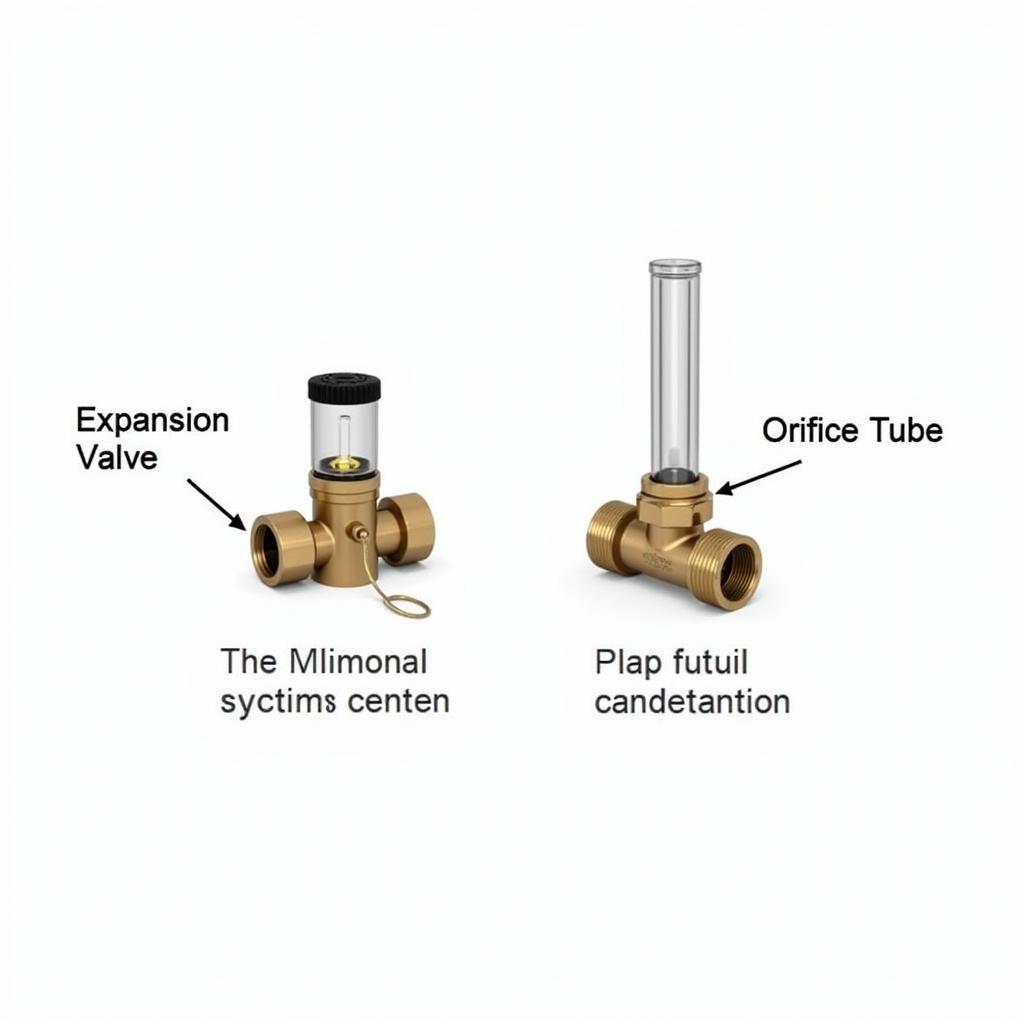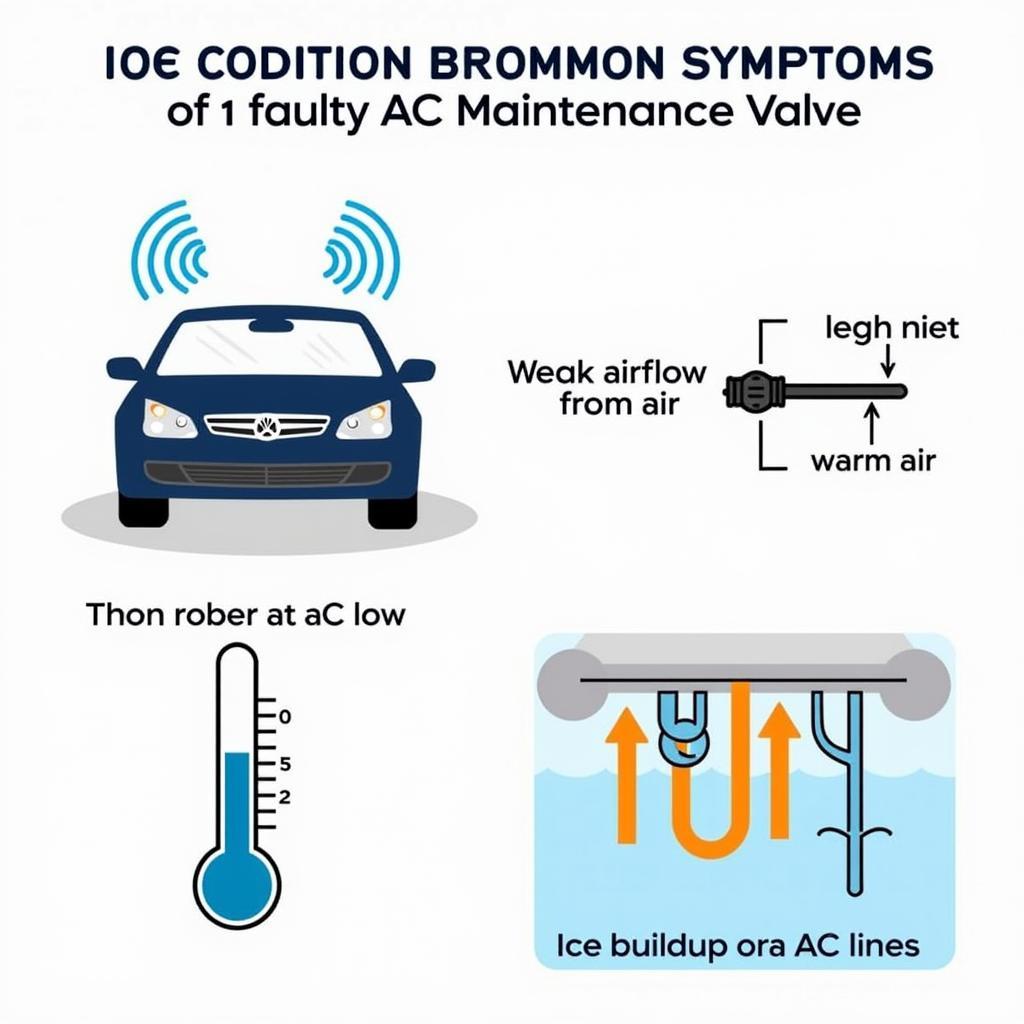AC maintenance is crucial for optimal vehicle performance, especially during warmer months. Understanding the role of the AC maintenance valve in your car’s air conditioning system is key to keeping cool and comfortable. This guide will delve into the importance of AC maintenance valves, common problems, troubleshooting tips, and preventative maintenance.
Similar to car maintenance schedule 100 000 miles, regular AC maintenance is essential. The AC maintenance valve, also known as the expansion valve or orifice tube, plays a critical role in regulating refrigerant flow and ensuring proper cooling. A malfunctioning valve can lead to a variety of issues, from reduced cooling performance to complete system failure.
What is an AC Maintenance Valve and Why is it Important?
The AC maintenance valve is a small but mighty component within the car’s AC system. Its primary function is to regulate the flow of refrigerant, the lifeblood of the cooling process. This valve precisely controls the amount of refrigerant entering the evaporator, which is responsible for absorbing heat and cooling the air blown into the cabin. Without a properly functioning AC maintenance valve, the system’s efficiency is compromised, and you might be left sweating on a hot day.
Types of AC Maintenance Valves
There are two main types of AC maintenance valves: expansion valves and orifice tubes. Expansion valves are more complex and are commonly found in newer vehicles. They use a temperature-sensing bulb to adjust refrigerant flow based on the temperature of the evaporator. Orifice tubes, on the other hand, are simpler, fixed-restriction devices commonly found in older vehicles.
 Types of AC Maintenance Valves: Expansion Valve and Orifice Tube
Types of AC Maintenance Valves: Expansion Valve and Orifice Tube
Common AC Maintenance Valve Problems
Several issues can arise with the AC maintenance valve, leading to decreased cooling performance or complete system failure. Some common problems include clogging, leaks, and sticking. Clogging occurs when debris or contaminants restrict refrigerant flow. Leaks can develop due to wear and tear or damage, leading to refrigerant loss. A sticking valve can disrupt the flow of refrigerant, resulting in inconsistent cooling.
Identifying a Faulty AC Maintenance Valve
How can you tell if your AC maintenance valve is the culprit behind your car’s cooling woes? Some telltale signs include weak airflow from the vents, warm air blowing instead of cold air, and unusual noises coming from the AC system. You might also notice frost or ice buildup on the AC lines. If you suspect a problem with your AC maintenance valve, it’s crucial to have a qualified technician diagnose the issue.
 Symptoms of a Faulty AC Maintenance Valve
Symptoms of a Faulty AC Maintenance Valve
Troubleshooting and Repairing AC Maintenance Valve Issues
Troubleshooting AC maintenance valve issues often requires specialized tools and knowledge. This is similar to the expertise required for [100 k car maintenance](https://autotippro.com/100-k-car maintenance/). A qualified technician will use gauges to measure refrigerant pressure and identify any leaks or blockages. They may also inspect the valve itself for signs of damage or wear. Repairing a faulty AC maintenance valve typically involves replacing the valve entirely.
Preventative Maintenance for Your AC System
Just like other car parts, your AC system benefits greatly from preventative maintenance. Regular inspections, as part of a comprehensive [car maintenance at 120 000 miles](https://autotippro.com/car maintenance-at-120-000-miles/), can help identify potential issues before they become major problems. Regularly changing the cabin air filter and ensuring the system is properly charged with refrigerant can also extend the life of your AC maintenance valve and the entire AC system. This is especially true in hotter climates.
“Regular AC maintenance, including checks on the maintenance valve, is often overlooked,” says John Smith, a certified automotive technician with over 20 years of experience. “But it’s a small investment that can prevent costly repairs down the road.”
Conclusion
The AC maintenance valve is a vital component of your car’s AC system. Understanding its function and the importance of regular maintenance is crucial for keeping your car cool and comfortable, particularly during the hot summer months. While troubleshooting and repair often require professional expertise, preventative measures can significantly extend the life of your AC system and prevent costly repairs. For any concerns or questions regarding your car’s AC system, don’t hesitate to contact AutoTipPro at +1 (641) 206-8880 or visit our office at 500 N St Mary’s St, San Antonio, TX 78205, United States.
Similar to maintaining other car parts, like those discussed in alto k10 car maintenance tips, AC maintenance is essential for optimal performance. For general car maintenance tips everyone should know, check out car maintenance everyone should know.




Leave a Reply